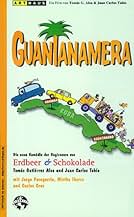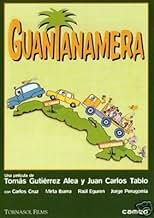Guantanamera
- 1995
- Tous publics
- 1h 45min
NOTE IMDb
6,9/10
1,6 k
MA NOTE
Film satirique sur la vie à Cuba. Les membres d'un cortège funèbre et des chauffeurs de camion se mettent à discuter de Dieu et du monde, découvrant combien leurs vies sont à la fois différe... Tout lireFilm satirique sur la vie à Cuba. Les membres d'un cortège funèbre et des chauffeurs de camion se mettent à discuter de Dieu et du monde, découvrant combien leurs vies sont à la fois différentes et similaires.Film satirique sur la vie à Cuba. Les membres d'un cortège funèbre et des chauffeurs de camion se mettent à discuter de Dieu et du monde, découvrant combien leurs vies sont à la fois différentes et similaires.
- Réalisation
- Scénario
- Casting principal
- Récompenses
- 7 victoires et 1 nomination au total
Luisa Pérez-Nieto
- Marilis
- (as Louisa Pérez Nieto)
José Ángel Espinosa 'Ferrusquilla'
- Justo
- (as Jose Antonio Espinosa)
Rubén Breña
- Rivero
- (as Rubén Breñas)
Avis à la une
The movie seems ambitious in its elements - a satire of bureaucratic Cuba (via the red tape associated with cross-country funeral delivery arrangements), frequent broad comedy (mainly in the truck driver's entanglements with his various women), much romantic wistfulness as the old man deals with a life largely wasted through lack of courage and Gina realizes the aridity of her marriage to Alonzo, within which her own creativity is stifled; the economic and cultural diversity of Cuba sketched in bits and pieces along the way. As executed, the overall framework for all of this - that of a loosely structured road movie - sets the tone more fully than might have been advisable: the rhythm reflects the leisurely procession along the road and the jauntily resigned renditions of the title song, which makes for good but not very provocative entertainment. The film seems to look back more than forward, with a pervasive sense of quiet nostalgia and regret about it, although there's also a gentle postivism that things can be overcome (with no thanks to the political infrastructure, it subtly suggests).
A small look at life in Cuba, "Guantanamera" portrays a world-famous Cuban singer returning to her hometown and suddenly dying. Her funeral procession reveals several things about the people involved, namely the love-starved existence of a woman sick of her creepy husband.
Obviously, we in the United States only get to hear about Cuba occasionally, so at the very least this movie should provide some insight into the state of affairs there (or just to hear the Cuban dialect, with its dropping of esses). But anything looking at people's individuals lives and how policies have affected them gets praise from me. We see how people have to abide by food rationing, among other things (of course, this is mainly due to the US blockade against the island). So I recommend this film.
Obviously, we in the United States only get to hear about Cuba occasionally, so at the very least this movie should provide some insight into the state of affairs there (or just to hear the Cuban dialect, with its dropping of esses). But anything looking at people's individuals lives and how policies have affected them gets praise from me. We see how people have to abide by food rationing, among other things (of course, this is mainly due to the US blockade against the island). So I recommend this film.
Guantanamera is a very laughable movie.The events sometimes seem absurd, however they are real.Guantanamera portrays situations that are common in daily Cuban life.The Director went beyond official parameters and adopted a critical attitude before the difficulties faced by people in actual Cuba.It is like Gutierrez Alea tells us: "let's laugh of our disgrace." Gutierrez Alea earned two things with this movie: the laugh of the audience, and the ire the President of his country in one of his speeches
Interesting satire on the Cuban bureaucracy. During the special period. Undresses the weakness of communist systems and their inability to provide logical answers within their rigid structure.
It is one of Titon's last works. But you can see the hand of the best Cuban film director. An excellent acting collective bringing together many of the best actors available at that time on the island. It is not the best film of its director but it makes it a adjustable time. The skinny part is that its problems are very local, which means that it is not received abroad as a strawberry and chocola by example. Also that limitation in time and space means that over the years I go losing the luide and the sympathy of its extreno.
It is one of Titon's last works. But you can see the hand of the best Cuban film director. An excellent acting collective bringing together many of the best actors available at that time on the island. It is not the best film of its director but it makes it a adjustable time. The skinny part is that its problems are very local, which means that it is not received abroad as a strawberry and chocola by example. Also that limitation in time and space means that over the years I go losing the luide and the sympathy of its extreno.
Guantanamera, a Cuban light drama by accomplished director Tomas Gutierrez Alea (1928-1996), is a tropical road movie. The setting is the 1990s, following withdrawal of USSR support for its little-brother Communist regime. A woman dies, some distance removed from Havana, and the goal is to transport her to the capital for burial. A tiny entourage of family accompanies the hearse.
Some snippets, though not central to the plot: How do government-run funeral homes work exactly, in a Communist country? Well, first, there is a per-person quota of refreshments for the bereaved and acquaintances who are paying last respects. But doesn't this attract inauthentic freeloaders? Second, there is a scene involving a meeting of regional mortuary-manager bureaucrats. If travel expenses for hearse trips are allocated according to the relative mileage of the territories through which vehicles traipse, the funeral home functionary in a crossroads region takes more than her share of budgetary hits. Is that fair? Third, there is the question of why the burial in Havana in the first place. If everybody and everywhere in Cuba are socialistically equal, what's wrong with the deceased staying put where she was? Meanwhile, we also have organized hitchhiking. Officials have the power to commandeer vacant seats from those who have for those who need.
There is some Latino romance, and some lightly subversive free enterprise. All in all, a likable movie. Mirta Ibarra, who starred twelve years earlier in Alea's 1983 film, Up To a Certain Point, gets an encore. She plays the niece of the deceased, who is also the wife of the over-serious Daniel Ortega-looking official who's in charge of the expedition.
Some snippets, though not central to the plot: How do government-run funeral homes work exactly, in a Communist country? Well, first, there is a per-person quota of refreshments for the bereaved and acquaintances who are paying last respects. But doesn't this attract inauthentic freeloaders? Second, there is a scene involving a meeting of regional mortuary-manager bureaucrats. If travel expenses for hearse trips are allocated according to the relative mileage of the territories through which vehicles traipse, the funeral home functionary in a crossroads region takes more than her share of budgetary hits. Is that fair? Third, there is the question of why the burial in Havana in the first place. If everybody and everywhere in Cuba are socialistically equal, what's wrong with the deceased staying put where she was? Meanwhile, we also have organized hitchhiking. Officials have the power to commandeer vacant seats from those who have for those who need.
There is some Latino romance, and some lightly subversive free enterprise. All in all, a likable movie. Mirta Ibarra, who starred twelve years earlier in Alea's 1983 film, Up To a Certain Point, gets an encore. She plays the niece of the deceased, who is also the wife of the over-serious Daniel Ortega-looking official who's in charge of the expedition.
Le saviez-vous
- AnecdotesFinal film directed by Tomás Gutiérrez Alea.
- ConnexionsReferenced in Last Night (1998)
Meilleurs choix
Connectez-vous pour évaluer et suivre la liste de favoris afin de recevoir des recommandations personnalisées
- How long is Guantanamera?Alimenté par Alexa
Détails
Box-office
- Montant brut aux États-Unis et au Canada
- 903 840 $US
- Week-end de sortie aux États-Unis et au Canada
- 8 851 $US
- 6 juil. 1997
- Montant brut mondial
- 903 840 $US
Contribuer à cette page
Suggérer une modification ou ajouter du contenu manquant















